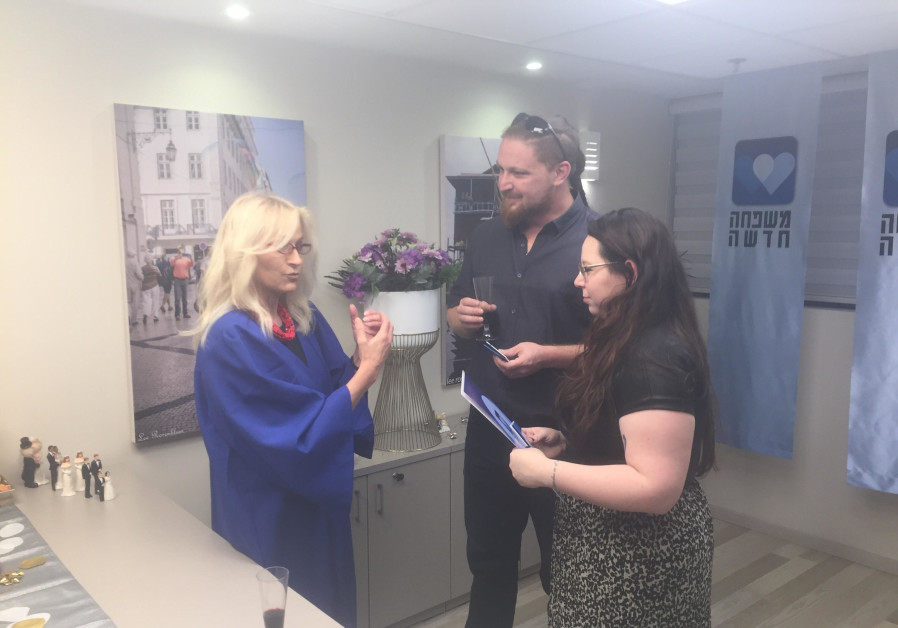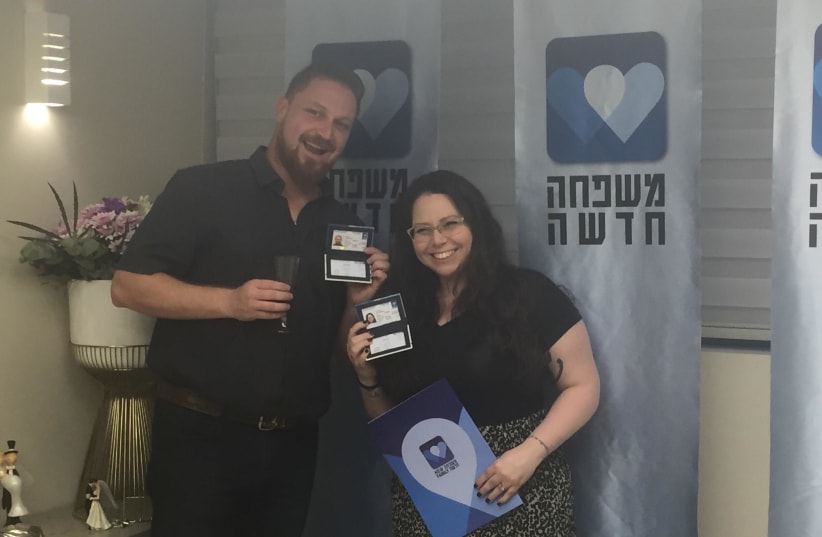For Razvan Malosh and Yael Vachbroit, turning to the New Family Organization was an easy choice. The modern couple felt that having their wedding ceremony conducted by a rabbi was out of the question.
“If you Google ‘civil marriage,’ this is the only option in Israel,” Malosh said while he waited with his wife-to-be in the lobby of New Family on Tiomkin Street in Tel Aviv.
The Israeli-born organization is led by Irit Rosenblum, a lawyer and philosopher who has spent her entire life working to make marriage laws better for people in Israel.
“State control interrupts intimate life. People want their freedom,” Rosenblum said. One way she has helped couples gain freedom is by keeping her services open late during Tel Aviv’s 2019 Layla Lavan or White Night Festival. This unique night is a non-religious cultural event hosted by the municipality, where everything stays open all night. This year, for the first time, New Family was no exception. Lawyers and advocates from the firm began the day at their regular time, 9 a.m., and continued working until midnight. By that time, the firm had already married 15 couples.

“It gives us the idea to do this once per week,” Rosenblum said.
The late-night hours proved to be attractive for people who have mainstream jobs. New Family helps couples pre- and post-marriage, offering a private environment for pairs to work out divorces or prenuptial agreements. That includes Oren Karni and his wife, who were married at the office two years ago, but didn’t complete their pre-nup.
“We didn’t want to go through the Rabbinate because it’s an archaic, corrupt institution. From a woman’s perspective, if you need a divorce, they make you go through hell. I don’t see why you’d have to adhere to all these primitive things they make you do,” Karni said, referring to a series of courses women are required to take if they ask for a divorce.
Malosh shared similar sentiments. While he and his wife did participate in a traditional Jewish wedding that was conducted by a Reform rabbi under a huppah (wedding canopy), there was no legal agreement signed that day. Neither partner was interested in a traditional wedding, but went through with the motions of the event to please parents and friends.
“If you go according to God, we are married. If you go by what is written at Misrad Hapnim [the Interior Ministry], we are not. If you go by what we believe in, yes we are [married] because we’ve been living together for quite a while,” Malosh explained. “But we do want to validate our union in some sort of way that will be legal.”
Couples who come to New Family first meet with a lawyer who takes care of paperwork. Then they have photographs taken for special common law marriage ID cards that have their spouse’s legal information on it. Finally, they are offered wine, stand in a room with romantic music and seal the deal with a kiss in front of Rosenblum. An associate ends the ceremony with a loud ringing of a bell and claps.
“The ID card comes in handy at the grocery store when you need your spouse’s teudat zehut [identity card] to get discounts,” Karni joked while he waited to see his lawyer about his prenuptial arrangement.
In the State of Israel, divorces are overseen by the Chief Rabbinate. The agreement must be handwritten on a scroll. The process can take a couple of hours and sometimes be costly. Malosh and Vachbroit had hoped to avoid similar potential problems. The two even considered leaving the country to get married, as many Israeli couples who want to escape the Rabbinate do, but they realized that if they should need a divorce, they’d still be slaves to the system. Working with New Family eliminated that fear. It offers a cozy environment where the two would be able to work things out legally, and outside of the rabbinical court should they need to.
Rosenblum’s education in philosophy plays a major role in her desire to change the landscape of Israeli law. Currently, the State of Israel claims that a marriage can only exist between two people of the same religion, citizenship and gender. The state does, however recognize gay marriages performed abroad.
“It’s these same movements that are going around the world – the queer movement, the liberal movement and the interfaith movement. People want to choose and have their own liberal life,” Rosenblum said.
But creating that life hasn’t been easy.
“It’s lobbying, changing laws, making court and Supreme court appeals. It’s my life’s work. It’s been 20 years and we’re still working and expanding the idea globally.”
Rosenblum also notes that for some Diaspora Jews, proving Jewish identity to the court in order to become legally married can be difficult and humiliating. In some cases, people must undergo an investigation by the state to prove their family’s Judaism if their bloodline is in question.
“What we are doing here is private regulation. The idea is giving the power to a couple to declare their status and to have the state accept it. We twist the power dynamic.”
She explains that in 1919, the British Mandate assigned religious leaders the right to grant civil marriages, a law that remains until today. Imams, rabbis and priests are the ones who are granted a license from the state to perform marriage ceremonies.Rosenblum is working to change the status quo and has succeeded in her private practice, which became recognized by Israel’s court in 2014.She continues her work globally, reaching the U.K. with her ideology and is in current negotiations with the Netherlands.
